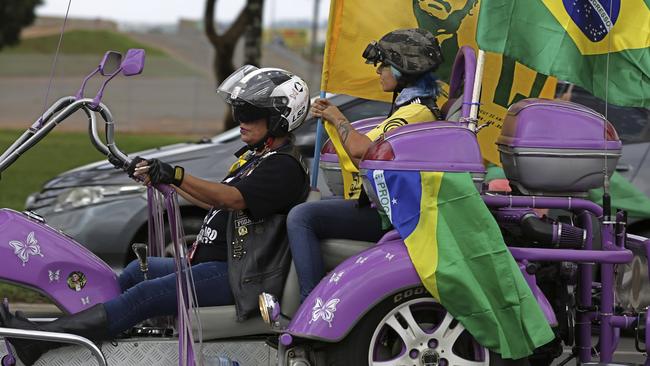Brazilian Right Jair Bolsonaro wins presidency
Far-right military man Jair Bolsonaro, who vowed to rescue Brazil from crisis, has won the country’s presidential election.

A military man vowing to rescue Brazil from crisis will become the country’s next president as Brazil’s 147 million voters cast their ballots late last night in a divisive runoff election.
Jair Bolsonaro, an ex-army captain known for his denigrating remarks on women, gays and black people, has won the presidency over leftist Fernando Haddad, Brazil’s top electoral court has announced.
And while Haddad has made up ground — he trailed by 18 points two weeks ago — it would take a dramatic surge for him to win. “This thing is going to turn around,” the former Sao Paulo mayor told thousands of supporters at his final campaign rally.
Mr Bolsonaro made his own final pitch on social media, the only place he has campaigned since an attacker stabbed him in the stomach at a rally last month, sending him to the hospital for three weeks. “God willing, tomorrow will be our new independence day,” he tweeted.
Coming on the heels of a punishing recession and staggering corruption scandal, the Latin American giant’s elections have thrown up a spectacular cast of characters, even by the standards of these divisive, anti-establishment times.
Bolsonaro, 63, repulses a large part of the electorate — and many outside the country — with his overtly misogynistic, homophobic and racist rhetoric. But an even larger portion of voters reject Mr Haddad and the tarnished legacy of his Workers’ Party (PT).
Mr Haddad, 55, is standing as a surrogate for jailed ex-president Luiz Inacio Lula da Silva, who led Brazil through the boom years of 2003-2010. Lula remains the country’s most popular politician, despite being accused of masterminding the massive pilfering of state oil company Petrobras. But the PT founder was barred from running because he is serving a 12-year prison sentence.
Mr Haddad, who lacks Lula’s charisma, has struggled to unite opposition to Mr Bolsonaro, despite mounting fears over what the former army officer’s presidency would look like.
His slogan is to make Brazil “happy again” — as in Lula’s poverty-fighting golden days — but it is an uncomfortable legacy. He ended up pulling his mentor’s image from his campaign ads.
Mr Bolsonaro harks back to a different past: that of the “Brazilian miracle” of rapid industrialisation under the military regime that ruled from 1964 to 1985. He has drawn criticism for his vocal defence of the dictatorship. He once said the regime’s “mistake” was that it tortured, instead of killing, leftist dissidents and suspected sympathisers.
But in an anti-establishment climate, his message has sold better than Mr Haddad’s. The election looks set to be decided as much by Brazilians voting against something as for it. A poll released at the weekend found 39 per cent of voters said they would not cast a ballot for Mr Bolsonaro under any circumstances. The rejection rate for Mr Haddad was even higher: 44 per cent.
Running for the small Social Liberal Party, Mr Bolsonaro is, according to many political analysts, a symptom of the crises ailing Brazil since the PT’s 13 years in power came crashing to an end with the impeachment of Dilma Rousseff in 2016.
Among those crises: Brazil’s economy shrank nearly 7 per cent during its worst-ever recession, from 2015 to 2016; the multibillion-dollar Petrobras scandal has left voters disgusted with the seemingly endless corruption of politicians and business executives; and there is widespread outrage over violent crime, in a country that registered a record 63,880 murders last year.
Outgoing President Michel Temer, himself implicated in corruption, is set to leave office on January 1 as the most unpopular president in Brazil’s modern democracy.
AFP


